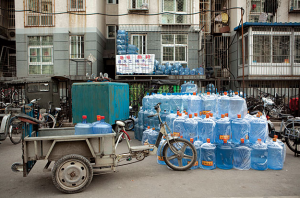In China, 70% of lakes and rivers have been polluted by power plants and chemical, paper, and textile factories. As a result of these industrial and agricultural expansions, Chinese consumers are concerned about water quality. They’re turning to bottled water as a safer alternative and that’s boosting Nestlé’s bottled-water sales in China. Sales of bottled water in the country will climb to $16 billion by 2017, up from $9 billion in 2012, according to Euromonitor.
As we have discussed on this blog, pollution treatment and cleanup techniques are costly. The water pollution and influx of foreign bottled-waters raise the free-rider problem.
Source: http://www.businessweek.com/articles/2013-01-24/chinas-unsafe-water-is-nestl-s-opportunity

Having come from a similar place (Nepal, to be specific), where tap water is undrinkable and everyone has to rely on bottled water for drinking purposes, I would say I do understand the situation here. Yes, the water pollution would probably raise Nestle’s sales in China, and of other bottled water brands, if any. But there are problems that come along with it too. Here are a few based solely on my experience:
1. Bottled water is not cheap, but water is necessary for everyone. Can everyone in China afford it?
2. Water pollution has been increasing a lot in Nepal too. Everyone has started to rely on bottled water for drinking purposes. But a few years ago, a case was found when a bottled-water company was just filling up regular tap water into the bottles and selling them at a higher price. Of course the brand was banned completely. But what are the chances that other bottle-water plants are doing the same thing? Constant watch in the plants would definitely help, but is costly. Is there any monitoring going on in China. I understand that Nestle is a big name but still, regular checks should be made in the plants.
3. Even if bottled water is being sold for drinking, what about water for other purposes? Water-borne diseases may be caused even if people come in contact with it for a long period of time. Do they wash clothes with this polluted water? Do they bathe in it? How is this problem being addressed?
China’s citizens have experienced victories over polluting companies. Six months ago, plans for a water-pipeline, which would have dumped pollutants into a nearby sea, were forced to be discarded after a violent protest. In this specific case, the local government intervened in order to bar the pipeline’s construction, showing a lack of political will to tighten up environmental standards at the cost of economic benefits.
Even when government entities will want to combat pollution it will still be difficult. Air and water pollution often transcends city and provincial jurisdictions, necessitating a significant level of cooperation among all levels of government.
Source: http://www.globaltimes.cn/content/724061.shtml
We of course have interjurisdictional issues as well, acid rain from remote sources, and access to water west of the Rockies. One clear set of cases revolve around the Great Lakes, Ontario, Quebec, Michigan, Minnesota, Wisconsin, Illinois, Indiana, Ohio, New York… There’s a lot of research on this coordination issue, both from the environmental science side and the political economy side.
One very interesting contrast between the West and China in regards to the bottle water industry is the West’s current move against plastic. In 2007, San Francisco barred city agencies from buying bottled water and Concord, MA recently forbade the sale of single-serve plastic water bottles. However, bottled water is a necessity in majority of China while it is mainly a luxury in the US. Purified Chinese water is often polluted as it travels to the households and until that issue is fixed bottled water is the best option. Now Nestle can look to China to compensate for the loss of demand in the West.
Additionally, although it may be expensive there will be a decrease in health costs due to drinking contaminated water.
We’ll see how well branded water does, lots of local competition. Of course at one time we had a plethora of local soda pop companies in the US… As to plastic, recycling is a profession in China, so that side of the calculation is a little different.